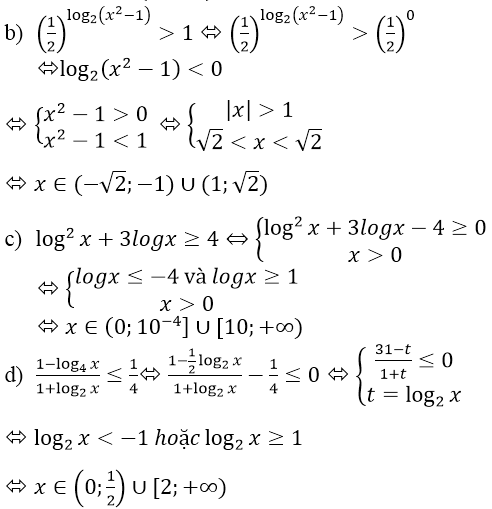Hãy nhập câu hỏi của bạn vào đây, nếu là tài khoản VIP, bạn sẽ được ưu tiên trả lời.

Điều kiện :
\(\begin{cases}x^2-4x+5>0\\3+\log_2\left(x^2-4x+5\right)\ge0\\5-\log_2\left(x^2-4x+5\right)\ge0\end{cases}\)
\(\Leftrightarrow x^2-4x+5\le2^5\)
\(\Leftrightarrow2-\sqrt{29}\le x\)\(\le2+\sqrt{29}\)
Đặt \(\begin{cases}u=\sqrt{3+\log_2\left(x^2-4x+5\right)}\\v=\sqrt{5-\log_2\left(x^2-4x+5\right)}\end{cases}\) \(\left(v,u\ge0\right)\)
Khi đó ta có hệ phương trình :
\(\begin{cases}u^2+v^2=8\\u+2v=6\end{cases}\)
Giải ra ta được :
\(\begin{cases}u=2\\v=2\end{cases}\) hoặc \(\begin{cases}u=\frac{2}{5}\\v=\frac{14}{5}\end{cases}\)
Từ đó suy ra \(\log_2\left(x^2-4x+5\right)=1\) hoặc \(\log_2\left(x^2-4x+5\right)=\frac{-71}{25}\) và tìm được 4 nghiệm của phương trình

\(1+\log_2\left(9^x-6\right)=\log_2\left(4.3^x-6\right)\)
Điều kiện : \(\begin{cases}9^x>6\\3^x>\frac{3}{2}\end{cases}\) \(\Leftrightarrow x>\log_96\)
\(1+\log_2\left(9^x-6\right)=\log_2\left(4.3^x-6\right)\Leftrightarrow9^x-2.3^x-3=0\)
\(\Leftrightarrow\begin{cases}3^x=-1\\3^x=3\end{cases}\) \(\Leftrightarrow3^x=3\Leftrightarrow x=1\) (thỏa mãn điều kiện)
Kết luận \(x=1\)

a) Điều kiện: \(\left\{{}\begin{matrix}4x+2>0\\x-1>0\\x>0\end{matrix}\right.\)
Hay là: \(x>1\)
Khi đó biến đổi pương trình như sau:
\(\ln\dfrac{4x+2}{x-1}=\ln x\)
\(\Leftrightarrow\dfrac{4x+2}{x-1}=x\)
\(\Leftrightarrow4x+2=x\left(x-1\right)\)
\(\Leftrightarrow x^2-5x-2=0\)
\(\Leftrightarrow\left[{}\begin{matrix}x_1=\dfrac{5+\sqrt{33}}{2}\\x_2=\dfrac{5-\sqrt{33}}{2}\left(loại\right)\end{matrix}\right.\)
Vậy nghiệm của phương trình là: \(x=\dfrac{5+\sqrt{33}}{2}\)
b) Điều kiện: \(\left\{{}\begin{matrix}3x+1>0\\x>0\end{matrix}\right.\)
Hay là: \(x>0\)
Biến đổi phương trình như sau:
\(\log_2\left(3x+1\right)\log_3x-2\log_2\left(3x+1\right)=0\)
\(\Leftrightarrow\log_2\left(3x+1\right)\left(\log_3x-2\right)=0\)
\(\Leftrightarrow\left[{}\begin{matrix}\log_2\left(3x+1\right)=0\\\log_3x=2\end{matrix}\right.\)
\(\Leftrightarrow\left[{}\begin{matrix}3x+1=2^0\\x=3^2\end{matrix}\right.\)
\(\Leftrightarrow\left[{}\begin{matrix}x=0\left(loại\right)\\x=9\end{matrix}\right.\)
Vậy nghiệm là x = 9.

Đặt :
\(t=\sqrt{x^2-5x+5}\left(t\ge0\right)\)
Bất phương trình trở thành :
\(\log_2\left(t+1\right)+\log_3\left(t^2+2\right)\le2\)
Xét \(f\left(t\right)=\log_2\left(t+1\right)+\log_3\left(t^2+2\right)\) trên \(\left(0;+\infty\right)\)
Do \(t\ge0\) nên \(\log_2\left(t+1\right)\) và \(\log_3\left(t^2+2\right)\) đều là các hàm số đồng biến, do đó f(t) đồng biến trên \(\left(0;+\infty\right)\)


